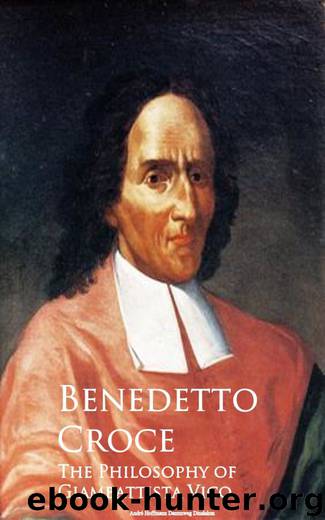The Philosophy of Giambattista Vico by Benedetto Croce

Author:Benedetto Croce [Croce, Benedetto]
Language: eng
Format: epub
Published: 2016-09-04T22:00:00+00:00
But the heroes did not provide for the stability of their order by means of forcible resistance alone. Just as, when they abdicated their position of sovereignty in their respective families for one of subordination to the higher sovereignty of the order, they formed a kind of noble or armed feudal system, so to keep their slaves more or less reconciled to obedience they granted them, without admitting them to citizenship, a kind of rustic feudalism. The origin of property is thus explained in a way entirely different on the one hand from the charmingly poetical theory according to which men adorned with all the virtues of the golden age when justice dwelt on earth, foreseeing the disorder that might result from communism, themselves with kindly arbitration marked out the limits of fields, endeavouring not to assign to one nothing but fertile, to another nothing but barren ground; to one a waterless portion, to another one abounding in perennial streams: and different on the other hand from the "philosophical" origin by a voluntary submission to the wise, or that invented by "politician kings" who derived property from violence. The granting of this rustic feudalism, which might be called the first agrarian law, distinguished three kinds of land-tenure: bonitary for the people, quiritary or noble, supported by arms, for the fathers, and eminent, belonging to the whole order. And since the strength of the order rested upon its wealth, it did all in its power to prevent the enrichment of the plebs; and in war—here we see the social motive of the "Roman clemency"—deprived the conquered of their arms only, leaving them in bonitary possession of their lands and imposing upon them a suitable tribute. For the same reason the patricians were very reluctant to go to war, for then the plebeian multitude gained experience of warfare and became dangerous.
The detachment of law from force was slow, and traces of the latter remained in every part of the former. In the heroic republic there were at first no laws providing for the punishment of offences and the restitution of private injuries; hence, failing judiciary laws, arose the need of duels and reprisals, which perpetuated the customs of the age of innocence or of the gods. Poetry and history describe some of these duels, which were armed judgments: for instance, that of Menelaus and Paris under the walls of Troy, and that of the Horatii and Curiatii, between Rome and Alba. It was a plan of divine providence, in order that between barbaric nations of scanty understanding and incapable of listening to reason war should not always beget war: that right and wrong might be to some degree determined by a belief in the favour or disfavour of the gods as the cause of victory or defeat.
These ordeals by battle were accompanied and superseded by ordeals by verbal formulae, used in their religious habit of mind with the most minute and scrupulous exactitude and with care not to alter a single letter ( religio verborum ).
Download
This site does not store any files on its server. We only index and link to content provided by other sites. Please contact the content providers to delete copyright contents if any and email us, we'll remove relevant links or contents immediately.
The remains of the day by Kazuo Ishiguro(8954)
Tools of Titans by Timothy Ferriss(8350)
Giovanni's Room by James Baldwin(7303)
The Black Swan by Nassim Nicholas Taleb(7091)
Inner Engineering: A Yogi's Guide to Joy by Sadhguru(6778)
The Way of Zen by Alan W. Watts(6580)
Asking the Right Questions: A Guide to Critical Thinking by M. Neil Browne & Stuart M. Keeley(5742)
The Power of Now: A Guide to Spiritual Enlightenment by Eckhart Tolle(5733)
The Six Wives Of Henry VIII (WOMEN IN HISTORY) by Fraser Antonia(5490)
Astrophysics for People in a Hurry by Neil DeGrasse Tyson(5171)
Housekeeping by Marilynne Robinson(4425)
12 Rules for Life by Jordan B. Peterson(4293)
Double Down (Diary of a Wimpy Kid Book 11) by Jeff Kinney(4253)
The Ethical Slut by Janet W. Hardy(4234)
Skin in the Game by Nassim Nicholas Taleb(4225)
Ikigai by Héctor García & Francesc Miralles(4221)
The Art of Happiness by The Dalai Lama(4117)
Skin in the Game: Hidden Asymmetries in Daily Life by Nassim Nicholas Taleb(3980)
Walking by Henry David Thoreau(3941)
